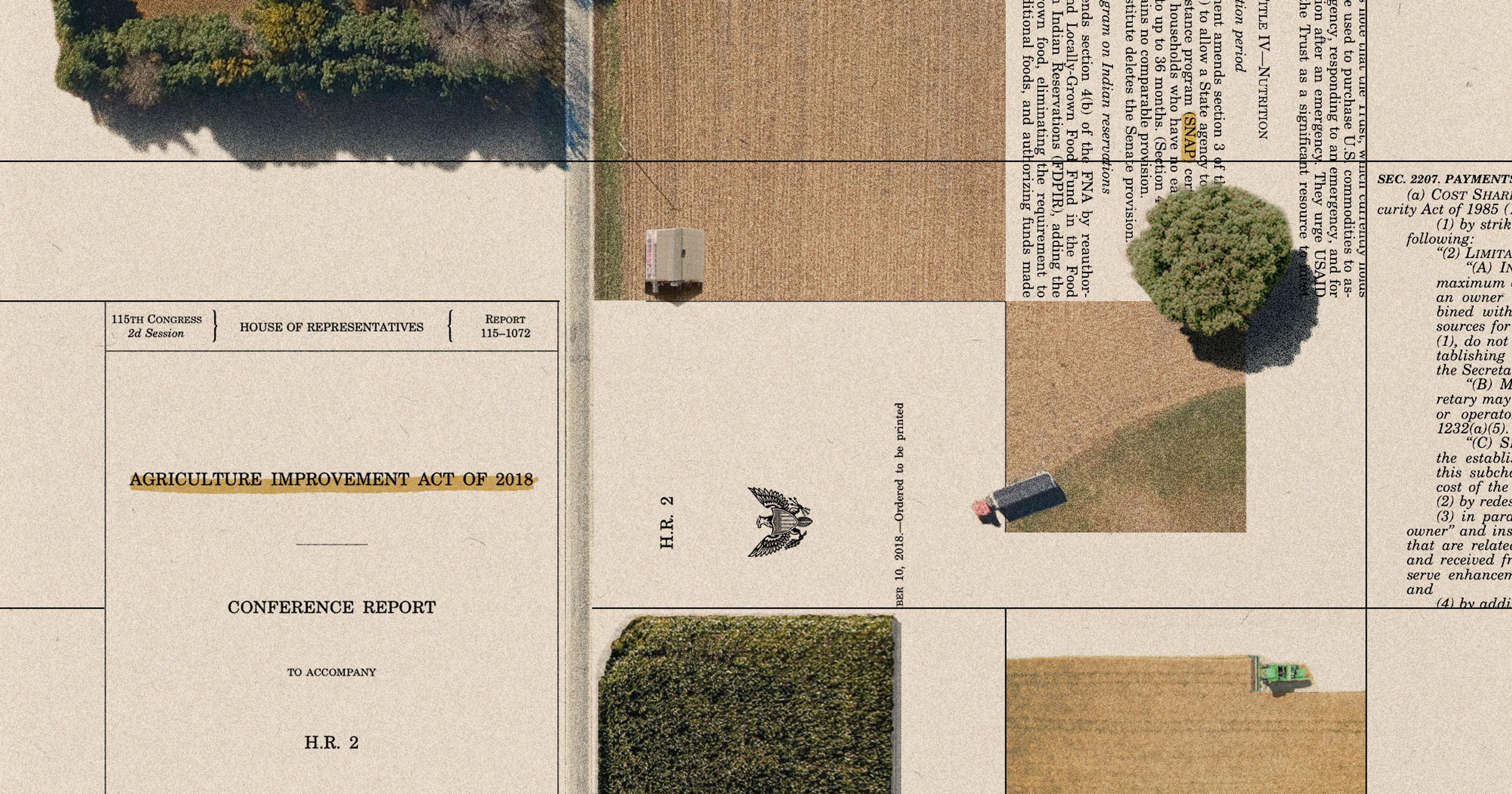Farm equipment manufacturer John Deere has failed to gain farmer confidence in its promise to make tractor and other repairs more accessible.
On January 8, John Deere, the largest farm equipment manufacturer in the world, signed a memorandum of understanding with trade association American Farm Bureau Federation (AFBF). It promised, among other things, to “continue to enhance the ability of Farmers to timely control the lawful operation and upkeep of Agricultural Equipment,” in the MOU’s language.
Such a “right-to-repair” agreement should have been welcomed as a long overdue development in a business where increasingly high-tech agricultural machinery that requires steep repair and replacement part costs from affiliated dealers — as opposed to independent repair technicians or farmers themselves — has become the norm. Actual farmers and farm advocates, though, received the news with frustration and a fair amount of scorn.
“There’s no specificity of language,” said Jared Wilson, a farmer who raises cattle and row crops on 4,000 acres in Butler, Missouri. Wilson’s also a pugnacious proponent of right-to-repair, having filed a complaint against Deere’s alleged anti-repair practices with the Missouri Attorney General as well participating in an antitrust suit against the company in federal court; a furious letter he penned to AFBF on January 9 accused the organization of potential corruption and incompetence in signing the MOU.
The document, he told Ambrook, “provides so much leeway for John Deere to be as bad an actor as they’ve already been.” Wilson is referring, for example, to the company’s failure to make good — along with AGCO, Kubota, and other manufacturers who are part of a West Coast farm equipment dealers association — on right-to-repair provisions agreed upon in 2018 with California’s Farm Bureau.* That earlier agreement “took the wind out of the sails of a right-to-repair bill that was moving through” the state legislature, said Kevin O’Reilly, right-to-repair campaign director for nonprofit Public Interest Research Groups (PIRG). By now, he said, farmer trust that Deere is acting with best intentions “has worn thin.”
By now, he said, farmer trust that Deere is acting with best intentions “has worn thin.”
Peek into the tractor shed of a small- or medium-scale farmer and you’ll likely find decades’ old equipment that’s well-worn but assiduously cared for. That’s because new farm equipment doesn’t come cheap — sprayers and combines might come in at over $500,000 each. “They all have electronic control units on them, [with] software that’s operating in tandem that has to be maintained,” Wilson said.
When something breaks, official Deere vendors use Service ADVISOR, a diagnostic system that O’Reilly called a “key tool” to figure out what’s gone wrong and where. The 2018 California agreement promised that farmers and independent technicians would get access to some of Service ADVISOR’s exclusive, proprietary diagnostics. Not only did that not happen, but in the interim, O’Reilly said, “Deere made what they call Customer Service ADVISOR available to farmers and to the public. You buy an annual subscription, which is about $2,400 a year, plus you [once needed to buy] a special laptop, and this, that, and the other thing, so it’s like $4,000 to $5,000 just to get your foot in the door. But it does not provide the same levels of access that dealer-level Service ADVISOR does.”
For example, certain diagnostic codes may come up that can only be accessed by a technician at dealerships affiliated with Deere, who Wilson said charge $180 an hour for labor in addition to expensive parts; recently, Wilson paid $4,500 for a hydraulic valve block whose electronic sensor had failed.
The current MOU between Deere and AFBF does not specifically make mention of Customer Service ADVISOR but “states that Deere is going to give farmers access to make more repairs on their own,” O’Reilly continued. “Question is, is this the same Customer Service ADVISOR tool that farmers already have access to? Or are they expanding permissions to actually allow farmers to completely fix their tractors?” The language of the MOU is unclear.
Willie Cade, anti-monopoly nonprofit Farm Action’s local leader, expressed even greater skepticism about the new MOU. “I say that 98% of what’s in the MOU has already been declared by John Deere so there’s nothing there,” he said. “They reiterated that they are going to at some point in 2023 give people who use Service ADVISOR with customer permissions the ability to download embedded software for free.”
He did not elaborate on why a voluntary MOU would be preferable to something enforceable and clear.
But Cade said he interpreted this to mean that, since Deere’s pricing is based on what they determine to be fair and reasonable, “they can change it at any time,” he wrote in an email. He called Deere a “formidable foe” that works against right-to-repair whenever it rears its head. Why bother? “Monopolized repair is anti-cyclical to new sales — if your new sales are going down, you can pick up revenue on repairs,” he said.
In fact, as journalist Cory Doctorow points out on his blog, the MOU promises that AFBF will “encourage” state Farm Bureaus to “refrain from introducing, promoting, or supporting federal or state ‘Right to Repair’ legislation that imposes obligations beyond the commitments in this MOU.” Sam Kieffer, AFBF’s vice president of Public Policy, said this restriction was “nothing new” and claimed that the MOU, which he called a “good first step,” was undertaken at the direction of its members who “preferred a national level MOU over state or federal legislation.” He did not elaborate on why a voluntary MOU would be preferable to something enforceable and clear.
The wording of the MOU also keeps the door open for the John Deere company to “enforce a trademark, copyright, or other claim of infringement regarding [Deere’s] intellectual property.” An Australian hacker who goes by Sick Codes, who recently made news for “jailbreaking” a Deere tractor, asked if that clause meant that the company was “excited to pursue” people like him. Answers are not forthcoming.
“The whole purpose of it is just to avoid regulation; a forced version of this [memorandum] would take more power away from John Deere and give back to the consumer,” Sick Codes said in a phone interview. “And the fact that the Farm Bureau doesn’t want that is kind of of an issue.”
Why don’t farmers just buy equipment from other manufacturers? Rather than make consumer-friendly equipment that is easier to repair, Wilson said equipment manufacturers are “more than willing to live in the shadow of John Deere’s policies and continue to collect their margin rather than try to give up some margin and increase their market share. That’s part of what signifies that this is such a broken system, that we’re not seeing some upstart company come out and be a market leader and develop more user-friendly ways to repair this stuff.”
Still, he and O’Reilly see hope in legislation pending in several states, including Colorado and Georgia, and in the Senate, where Democrat Jon Tester of Montana introduced a bill last February. “In an ideal world, you would be able to 3D print your own part, but that’s not really what right-to-repair is about right now,” O’Reilly said. For the moment, state and federal laws need to pass “to make sure that the basic principle of farmers fixing 100% of their tractor is the law of the land, and then make every manufacturer abide by [it].”
*The California Farm Bureau Federation did not respond to a request for comment; representatives of John Deere were unavailable for comment.
This article has been updated with quotes from Sick Codes.







